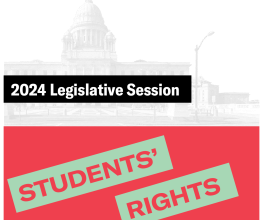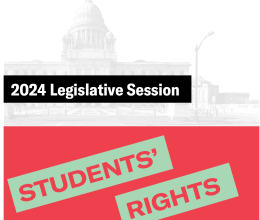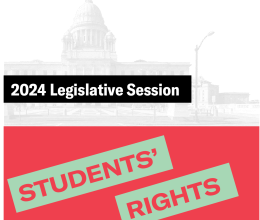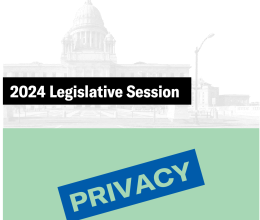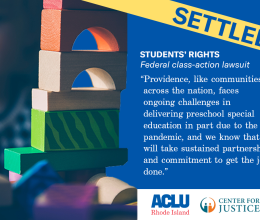Fourteen organizations have called on the Board of Regents for Elementary and Secondary Education to refrain from voting today, as planned, on revised regulations governing high school graduation requirements for students in Rhode Island. In a four-page letter to Board members, the groups said that the revised proposal “includes very significant changes from the proposal presented for public comment in January, raises more questions than it answers, and creates new and additional concerns.”
After three contentious and well-attended public hearings, Department of Education Commissioner Deborah Gist indicated last month that she would recommend postponing for two years the implementation of high stakes testing requirements and eliminating a much-criticized “three tier” diploma system. However, the organizations signing the letter to the Board of Regents – including the RI ACLU, RI Disability Law Center, the Autism Project, RI Legal Services, Urban League of RI, Progreso Latino, Parent Support Network of RI, the Center for Hispanic Policy and Advocacy, Young Voices and the George Wiley Center – called it “critical that the public have further opportunity to comment on the new proposal through public hearings so that the intended and unintended consequences of these regulations are fully understood and addressed.” The groups noted that the regulations being considered today have gone through three revisions since the public hearings were completed.
In explaining why the proposed revisions should go through another public hearing process, the organizations pointed to significant ambiguities and changes in the revised rules. Among them are the following:
- Although the proposed revisions have been described as an abandonment of the universally decried three-tier diploma system, they substitute a two-tier system that would function very similarly, again effectively labeling students as “not proficient” based on their standardized testing scores. According to 2010 test scores, this group would once again include the overwhelming majority of students who are non-white, poor, have disabilities or are English language learners.
- Although the proposed revisions will first apply the high stakes testing standards to the Class of 2014, the proposed revisions do not address the fact that an entirely new standardized test is expected take the place of the current NECAP test right around that time.
- The proposed revisions, the groups argue, would remove rather than strengthen much of the systemic accountability for student progress that existed in earlier versions, making it less likely that system reform and adequate student support would be provided.
- Although the revised regulations purport to offer alternative re-test opportunities for students who do not score well on the NECAP test, the revisions do not adequately address the timing and logistical difficulties of doing so.
The letter concluded by asking the Board of Regents to take two actions: “provide an opportunity for public comment on any revised regulations before their final adoption, as they include serious and material changes, some of which run directly contrary to previous public comment, and many of which remain confusing and require further elaboration,” and “clarify that existing 2011 graduation requirements will be maintained in the interim, until final reform decisions are made.”
Many of the organizations signing the letter participated in a news conference in January in which they claimed that the new regulations would essentially institutionalize a caste system in Rhode Island’s public schools. Extrapolating from recently-released test scores for the Class of 2011, the groups noted at the time that close to 90% or more of special education, limited English proficient, economically disadvantaged, Latino and African-American students would be at risk of either receiving no diploma at all or one designating them only as “partially proficient,” effectively announcing their lack of proficiency to all potential employers and colleges.
Other signatories on the letter to the Board of Regents included the Children’s Policy Coalition, the Refugee After-School Program and Advocacy Group, Rhode Island Teachers of English Language Learners, and the Mental Health Association of RI.


